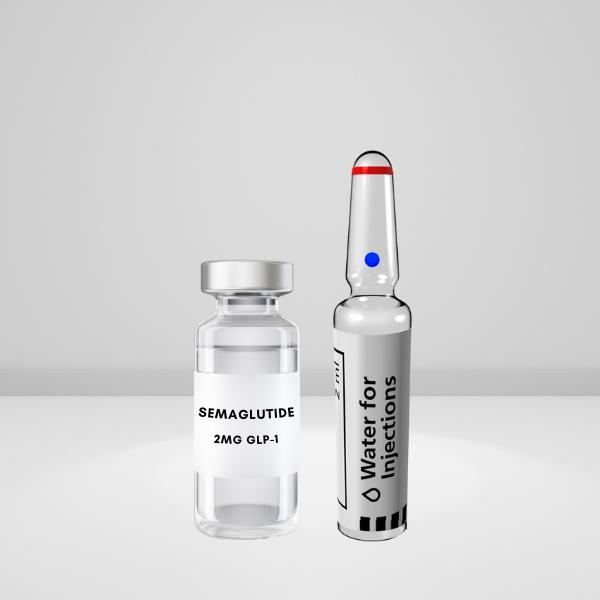linical Test Expectation – GLP-1 – Human Subjects : Lower blood sugar levels, enhance insulin secretion, improve heart, liver, and lung function while helping to slow or prevent the effects of Alzheimer’s disease. Decrease appetite by delaying gastric emptying and reducing intestinal motility. Reduce weight gain
Strength – 2MG per vial
Introduction
Along with helping to control blood sugar and boost weight loss, GLP-1s and SGLT-2 inhibitors seem to have other major benefits. Research has found that some drugs in these groups may lower the risk of heart disease, such as heart failure, stroke and kidney disease.
There’s a class of type 2 diabetes drugs that not only improves blood sugar control but is best for weight loss. This class of drugs is commonly called glucagon-like peptide 1 (GLP-1) agonists (semaglutide). A second class of drugs that may lead to weight loss and improved blood sugar control is the sodium glucose cotransporter 2 (SGLT-2) inhibitors. These include canagliflozin (Invokana), ertugliflozin (Steglatro), dapagliflozin (Farxiga) and empagliflozin (Jardiance).
Weight loss can vary depending on which GLP-1 drug you use and your dose. Studies have found that all GLP-1 drugs can lead to weight loss of about 4.8 to 7.2 kilograms, when using liraglutide. Studies found people using semaglutide and making lifestyle changes lost about 15.3 kilograms versus 2.6 kilograms in those who didn’t use the drug.
Diabetes drugs in the GLP-1 agonists class are generally taken by a shot (injection) given daily or weekl.
These drugs mimic the action of a hormone called glucagon-like peptide 1. When blood sugar levels start to rise after someone eats, these drugs stimulate the body to produce more insulin. The extra insulin helps lower blood sugar levels.
Lower blood sugar levels are helpful for controlling type 2 diabetes. But it’s not clear how the GLP-1 drugs lead to weight loss. Doctors do know that GLP-1s appear to help curb hunger. These drugs also slow the movement of food from the stomach into the small intestine. As a result, you may feel full faster and longer, so you eat less.
Along with helping to control blood sugar and boost weight loss, GLP-1s and SGLT-2 inhibitors seem to have other major benefits. Research has found that some drugs in these groups may lower the risk of heart disease, such as heart failure, stroke and kidney disease. People taking these drugs have seen their blood pressure and cholesterol levels improve. But it’s not clear whether these benefits are from the drug or the weight loss.
The downside to GLP-1 drugs is that all but one has to be taken by a shot. And, like any drug, there is a risk of side effects, some serious. More common side effects often improve as you continue to take the drug for a while.
Some of the more common side effects include:
- Nausea
- Vomiting
- Diarrhea
Low blood sugar levels (hypoglycemia) are a more serious risk linked to the GLP-1 class of drugs. But the risk of low blood sugar levels often only goes up if you’re also taking another drug known to lower blood sugar at the same time, such as sulfonylureas or insulin.
The GLP-1 class of drugs isn’t recommended if you have a personal or family history of medullary thyroid cancer or multiple endocrine neoplasia. Lab studies have linked these drugs with thyroid tumors in rats. But until more long-term studies are done, the risk to humans isn’t known. They’re also not recommended if you’ve had pancreatitis.
Dosing Details
STARTING DOSE : You inject 2ml water into the vial of GLP-1 from the water ampoule.You then wait for the vial powder content to dissolve ON ITS OWN. DO NOT SHAKE THE VIAL TO MIX POWDER. Once dissolved and clear in colour you draw out 0.25ml once a week in the morning before breakfast and inject it into the tummy under the skin into the fatty skin layer.
Dosage can increase to 0.5mg (0.5m) after 4 weeks of use. Thereafter dosage can increase again to 1mg (1ml) per week. We do not recommend higher than 1mg but many users do maintain dosage of up to 2mg per week.





